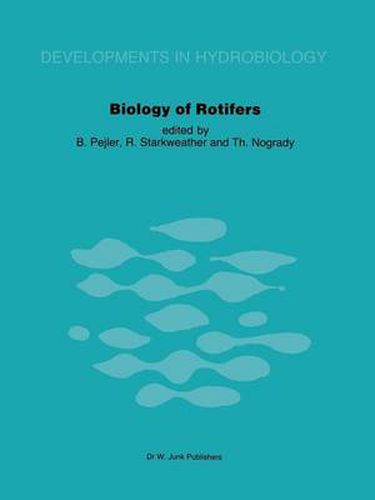Readings Newsletter
Become a Readings Member to make your shopping experience even easier.
Sign in or sign up for free!
You’re not far away from qualifying for FREE standard shipping within Australia
You’ve qualified for FREE standard shipping within Australia
The cart is loading…






This title is printed to order. This book may have been self-published. If so, we cannot guarantee the quality of the content. In the main most books will have gone through the editing process however some may not. We therefore suggest that you be aware of this before ordering this book. If in doubt check either the author or publisher’s details as we are unable to accept any returns unless they are faulty. Please contact us if you have any questions.
Since the two previous rotifer symposia in Lunz and Gent were highly successful, it was considered important to continue the tradition every third year. Thus a third rotifer symposium was held in Uppsala, Sweden, Aug. 30-Sept. 4, 1982. In the beginning of 1981 the first circular was mailed to the participants of the previous symposia, who in turn were requested to suggest names of other scientists to be invited. As a result many people expressed interest, about 70 of whom finally participated in the symposium (not including temporary visitors from nearby). The participants represented 22 countries, in Europe, North America, Asia and Australia. As with the earlier symposia, some subjects were selected in advance, mainly during discussions between Henri Dumont, Birger Pejler and Peter Starkweather when they met at the SIL congress in Kyoto 1980. Some broad topics such as ‘Marine rotifers’ were covered for the first time, while other topics were continuations, though more specialized, of previous themes. Thus it is interesting to follow, through the three symposium volumes, recent development within the areas of feeding, popUlation dynamics and ultrastructure. Each prospective participant (with the exception of the reviewers) was invited to present one short paper (alone or with collaborators), which resulted in more than 40 such contributions. Thus, the week’s schedule became very crowded, unfortunately leaving no time for more comprehensive workshops etc. However, during the evenings general discussions were held on the topics presented during the day.
$9.00 standard shipping within Australia
FREE standard shipping within Australia for orders over $100.00
Express & International shipping calculated at checkout
This title is printed to order. This book may have been self-published. If so, we cannot guarantee the quality of the content. In the main most books will have gone through the editing process however some may not. We therefore suggest that you be aware of this before ordering this book. If in doubt check either the author or publisher’s details as we are unable to accept any returns unless they are faulty. Please contact us if you have any questions.
Since the two previous rotifer symposia in Lunz and Gent were highly successful, it was considered important to continue the tradition every third year. Thus a third rotifer symposium was held in Uppsala, Sweden, Aug. 30-Sept. 4, 1982. In the beginning of 1981 the first circular was mailed to the participants of the previous symposia, who in turn were requested to suggest names of other scientists to be invited. As a result many people expressed interest, about 70 of whom finally participated in the symposium (not including temporary visitors from nearby). The participants represented 22 countries, in Europe, North America, Asia and Australia. As with the earlier symposia, some subjects were selected in advance, mainly during discussions between Henri Dumont, Birger Pejler and Peter Starkweather when they met at the SIL congress in Kyoto 1980. Some broad topics such as ‘Marine rotifers’ were covered for the first time, while other topics were continuations, though more specialized, of previous themes. Thus it is interesting to follow, through the three symposium volumes, recent development within the areas of feeding, popUlation dynamics and ultrastructure. Each prospective participant (with the exception of the reviewers) was invited to present one short paper (alone or with collaborators), which resulted in more than 40 such contributions. Thus, the week’s schedule became very crowded, unfortunately leaving no time for more comprehensive workshops etc. However, during the evenings general discussions were held on the topics presented during the day.